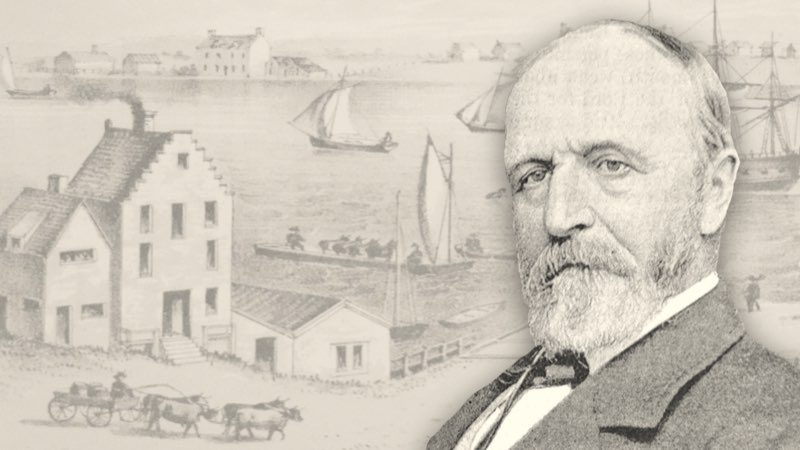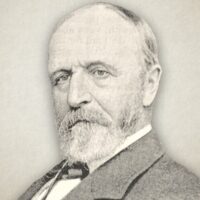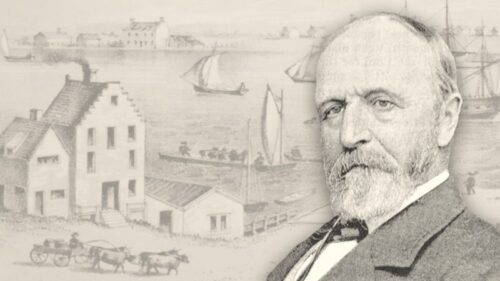
The Life And Testimony Of Charles Graham
Earthen Vessel 1892:
Mr. Charles Graham, New York, America
Dear Brother Winters,—It is with the greatest difficulty I begin to write about myself. I commenced to preach at the same time that brother William Bracher began in 1841, and preached in and around London until 1850. I came out here alone without my family. When I landed, the first place I called at with reference to religious matters was the late Mr. Axford’s. I then attended the Old School Baptists preaching in a hall. I thought they were sound in the faith. After a few weeks I met a brother named Nash at the meeting. He saw I was a stranger, and spoke to me and took me home to dinner. He also took me the same day to hear a coloured minister named J. J. Raymond, and introduced me to him. He asked me to preach for him. He was a great preacher, and believed the Lord began the work in the sinner’s heart; but otherwise did not insist upon the great doctrines of grace. He did not oppose them, but agreed with them in a general way. He had a large Church. I first opened my mouth in New York, and then I preached in another place in the 8th Avenue. Then I went a good many times to an Old School Baptist place in Jersey, called Washington village, about forty miles from New York. I preached on Statin Island, across the New York Bay. In various places, wherever a door was opened, I went and asked no questions. In May, 1851, my wife and six little children joined me here; the oldest was eight years of age and the youngest four months. The latter was born after I left, but all came over safely. In the summer the coloured minister went on a vacation for two months, and engaged me to supply his pulpit while he was away, which I did without fee or reward.
In the spring of 1852 a coloured brother came after me to preach for Zion Baptist Church. I had never heard of it before. They heard of me preaching at the Abyssinian Baptist Church. Some of the brethren heard me there. Mr. J. J. Raymond was their first minister. I went. The Church numbered about three hundred, but they had been scattered a good deal, and were nearly all Arminians. But I found their experience was god-like, and preached in my usual way, and they seemed to receive the word greedily. I led them like a father, and told them instead of their giving their hearts to God, it was God that gave them new hearts and called them with a holy calling. After a time I branched out into the covenant ordered in all things and sure, then electing love and redeeming grace. That was one of the first intimations I had of the Spirit of God working in their hearts, and it went through the Church until all was leavened with the dew of heaven. Up to that time no white man came near me. A few dropped in occasionally, and went away again.
About the same time brother John Keave, a member of Mr. Wells’ Church, came here. I knew him when in London as a sound preacher. He had been out West. I was then in a small way of business for myself. He had to wait some weeks for a ship, and I gave him employment while he waited. I took him with me to a coloured Church, and he preached well, as we say here, “as a golden dollar:” Well, I found him a handy man, a good carpenter, although over sixty years of age. I said, just before the ship was to sail, “Dear Brother Neave, what are you going home for? You had better stop here.” Well, he did so over six years, until 1859. I afterwards said, “You go to the coloured Church one Sunday, I will go the next, then we will each have an open Sunday. ‘ We did so, but I had no thought of ever being the stated pastor. After we had continued for months to preach, brother Neave told me one Monday morning he had spoken to the deacons, and they all said to him they would prefer brother Graham to settle as pastor. Well the time was appointed and all the Church and deacons met together, also another brother; I don’t remember his name, but think it was Chapman, a minister from England. I gave my experience, and brother Neave gave the charge, and I was publicly recognized as the pastor of Zion Baptist Church; this was in 1853.
Some time after this a minister came from Australia. He had been in the British army in India. His name was William Erskine, and was a native of Edinburgh, but brought up in Yorkshire, in England. A love sprung up between us that only ended in this world at the grave in 1875. I felt this the greatest blow that ever befell me at a death outside my own family. He was the last white brother I had any help from. I preached his funeral sermon at our Church, and all felt they had lost a noble and loving brother. From this time forward death made terrible strides among the old members. In 1882 death took three of the deacons, men that knew what Israel ought to do. I became sick and too old to continue the Church services and my own business as well. In 1884 I left for good. They had others that came and filled the Church with the old free-will doctrine. I refused at last to go there. With regard to our present brethren, a great deal is to be said in their favour. When I came here you have no idea of the prejudice against down-trodden fugitive slaves. They were not allowed to ride in any public conveyance. The Abolitionist meetings were often broken up and the furniture in the halls smashed to pieces, and the speakers scarcely escaped with their lives. I have been insulted at funerals for being in a carriage with colours, and I have been hooted in the streets as a coloured minister. I did not know they had even taken the trouble to hear me preach, but they had, as four of my old flock came to Grand-street to hear me. Brother Higgs told them he had heard me preach my first sermon in the coloured Church, and the text I spoke from was “The vision is yet for an appointed time” (Hab. 2:3).
I visited England again in 1883. Thus I have been led all the way by an unseen hand, and all that I have any wish for in this evil world is to finish my course with honour to my God and Father, and if any words were written on my tombstone they should be “Is this not a brand plucked out of the fire?”
I may say, before closing this letter, that I was born in a small town in Perthshire, Scotland, called Dunkeld, about twenty-five miles from the birthplace of the late Mr. A. Taylor, of Manchester. The last time I was in the Register-General’s Office, Edinburgh, Scotland, I searched the register for the date of my birth, and found that I was born on December 5th, 1811. I really thought I was several years younger. The Lord, I trust, has brought me by a right road towards the city of habitation, whose builder and maker is God. I went to London in 1836 as destitute of any good, as a wild ass’s colt. Very soon after that the Lord met me as, I believe, in a very mysterious manner, without any effort of my own in the way of seeking Him, and from that day to this He has borne with my manners in the wilderness, and has not cast me off as I have thousands of times deserved. The reason is because His love changes not.
I hope, dear brother, I was mistaken in what you said on the wrapper of your April number, that you intended to publish my portrait with a sketch of my life shortly. Would it not be better to let me finish my days before publishing anything about me, as that cannot be long now? I say again, you must take the responsibility for what you purpose giving of my career in your July number. Love to all who love our Lord Jesus Christ in sincerity, and in harmony with good old John Kent I would say:—
“Come, saints, and sing in sweet accord;
With solemn pleasure tell,
The cov’nant made with David’s Lord,
In all things ordered well.”
Sincerely and truly yours,
Charles Graham
726, Third-avenue, New York
[Although it has never been our pleasure to meet brother Charles Graham in the flesh, we have long held fellowship together by letter and through the magazine. During the time he visited London, nearly ten years ago, we were engaged from home, and therefore did not see him. May it be our happy lot to meet at last, as the Scotch poet says, “I’ the Ian’ o’ the leal,” and as Medley sang:—”Join the sweet song and there adore, A precious Christ for evermore.’’—Editor]Charles Graham (1811-1893) was a Strict and Particular Baptist preacher. A native of England, he migrated to the United States (New York) where he served as pastor for a church meeting at Brooklyn.




